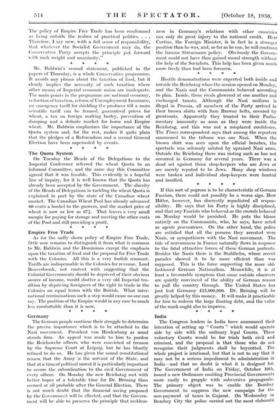Germany The German people continue their struggle to determine the
precise importance which is to be attached to the Nazi movement. President von Hindenburg as usual stands firm. An appeal was made to him to pardon the Reichswehr officers who were convicted of treason by the Supreme Court at Leipzig, but he has bluntly refused to do so. He has given the sound constitutional reason that the Army as the servant of the State, and that at a time of political unrest it is particularly important to secure the subordination to the civil Government of every officer. On Monday the new Reichstag met with better hopes of a tolerable time for Dr. Bruning than seemed at all probable after the General Election. There is not much doubt that the financial saving proposed by the Government will he effected, and that the Govern- ment will be able to preserve the principle that reckless-
- ness in Germany's relations with other countries can only do great injury to the national credit. Herr Curtius, the Foreign Minister, is in fact in a stronger position than he was, and, so far as he can, he will continue the famous Stresemann policy. Obviously the Govern- ment could not have thus gained moral strength without the help of the Socialists. This help has been given much more freely than had been foreseen.
* * * *
























































 Previous page
Previous page